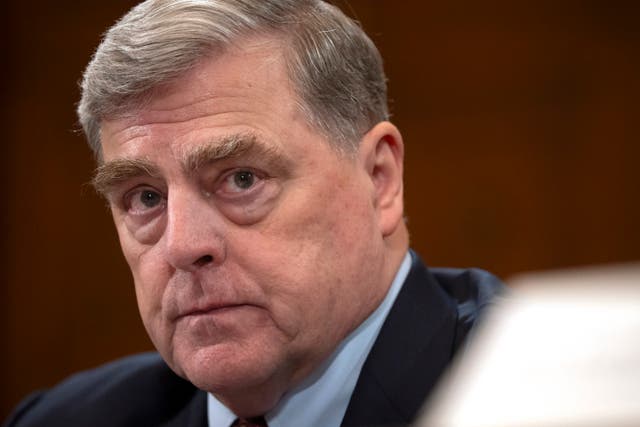Anthony Fauci among final pardons as Biden moves against potential retribution
The decision by Mr Biden comes after Donald Trump warned of an enemies list.

US President Joe Biden has pardoned Dr Anthony Fauci, retired general Mark Milley and members of the House committee that investigated the January 6 attack on the Capitol, using the extraordinary powers of his office in his final hours to guard against potential “revenge” by the incoming Trump administration.
The decision by Mr Biden comes after Donald Trump warned of an enemies list filled with those who have crossed him politically or sought to hold him accountable for his attempt to overturn his 2020 election loss and his role in the storming of the US Capitol on January 6 2021.
Mr Trump has selected Cabinet nominees who backed his election lies and who have pledged to punish those involved in efforts to investigate him.
Dr Fauci, who helped co-ordinate the nation’s response to the Covid-19 pandemic, raised the ire of Mr Trump when he refused to back his unfounded claims.
He has become a target of intense hatred and vitriol from people on the right, who blame him for mask mandates and other policies they believe infringed on their rights, even as tens of thousands of Americans were dying.
Dr Fauci told ABC: “I really truly appreciate the action President Biden has taken today on my behalf.
“I have committed no crime … and there are no possible grounds for any allegation or threat of criminal investigation or prosecution of me.”
Mark Milley is the former chairman of the Joint Chiefs of Staff. He later called Mr Trump a fascist and detailed Mr Trump’s conduct around the deadly January 6 insurrection in 2021. He said he was grateful to Mr Biden for a pardon, as he no longer has to worry about “retribution”.
Mr Biden said in a statement: “The issuance of these pardons should not be mistaken as an acknowledgment that any individual engaged in any wrongdoing, nor should acceptance be misconstrued as an admission of guilt for any offence.
“Our nation owes these public servants a debt of gratitude for their tireless commitment to our country.”
The pardons, announced with just hours left of the Biden presidency, have been the subject of heated debate for months at the highest levels at the White House.

Mr Biden has used the power in the broadest and most untested way possible: to pardon those who have not even been investigated yet. The decision lays the groundwork for an even more expansive use of pardons by Mr Trump and future presidents.
While the US Supreme Court last year ruled that the president enjoys broad immunity from prosecution for what could be considered official acts, the president’s aides and allies enjoy no such shield.
Mr Trump, who takes office later on Monday, has promised to, in his first moments as President, pardon many of those involved in the violent and bloody January 6 2021, attack, which injured roughly 140 law enforcement officers.
It is unclear whether those pardoned by Mr Biden would need to apply for the clemency or even accept the offer at all.
Any acceptance could be seen as a tacit admission of guilt or wrongdoing, validating years of attacks by Trump and his supporters, even though those who have been pardoned have not been formally accused of any crimes.
“These are exceptional circumstances, and I cannot in good conscience do nothing,” Mr Biden said, adding that “even when individuals have done nothing wrong – and in fact have done the right thing – and will ultimately be exonerated, the mere fact of being investigated or prosecuted can irreparably damage reputations and finances”.
Mr Biden is not the first to consider such pre-emptive pardons – Trump aides considered them for him and his supporters involved in his failed efforts to overturn the 2020 presidential election that culminated in the Capitol riots. But Mr Trump’s pardons never materialised before he left office four years ago.
Gerald Ford granted a “full, free, and absolute pardon” in 1974 to his predecessor, Richard Nixon, over the Watergate scandal.
He believed a potential trial would “cause prolonged and divisive debate over the propriety of exposing to further punishment and degradation a man who has already paid the unprecedented penalty of relinquishing the highest elective office of the United States”, as written in the pardon proclamation.





